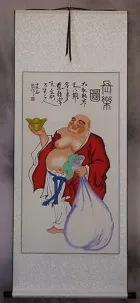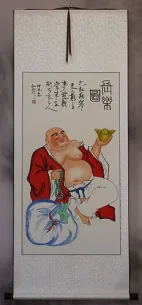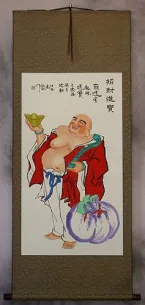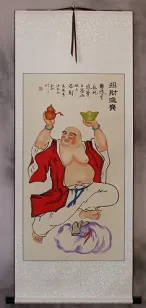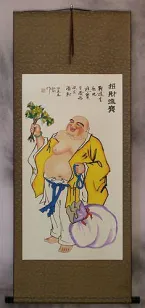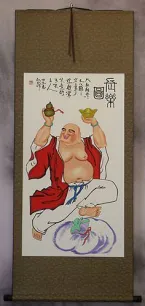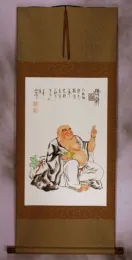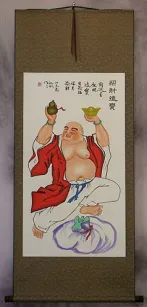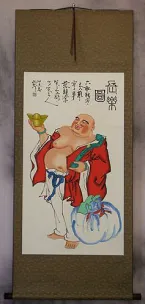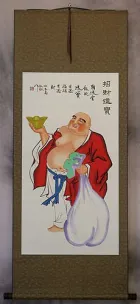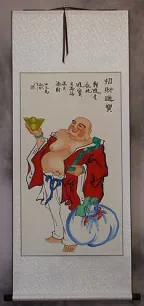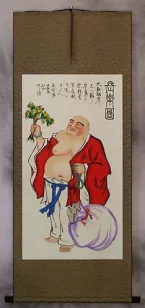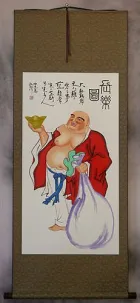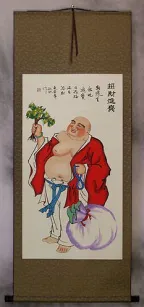Many custom options...
And formats...

Happy Buddha in Chinese / Japanese...
Buy a Happy Buddha calligraphy wall scroll here!
Happy Buddha
Buddha of Joyful Light
This in-stock artwork might be what you are looking for, and ships right away...
Gallery Price: $200.00
Your Price: $69.88
Not the results for happy buddha that you were looking for?
Below are some entries from our dictionary that may match your happy buddha search...
| Characters If shown, 2nd row is Simp. Chinese |
Pronunciation Romanization |
Simple Dictionary Definition |
三福 see styles |
sān fú san1 fu2 san fu mifuku みふく |
(place-name, surname) Mifuku The three (sources of) felicity: (1) The 無量壽經 has the felicity of (a) 世福 filial piety, regard for elders, keeping the ten commandments; (b) 戒福 of keeping the other commandments; (c) 行福 of resolve on complete bodhi and the pursuit of the Buddha-way. (2) The 倶舍論 18, has the blessedness of (a) 施類福 almsgiving, in evoking resultant wealth; (b) 戒類福 observance of the 性戒 (against killing, stealing, adultery, lying) and the 遮戒 (against alcohol, etc.), in obtaining a happy lot in the heavens; (c) 修類福 observance of meditation in obtaining final escape from the mortal round. Cf. 三種淨業. |
化生 see styles |
huà shēng hua4 sheng1 hua sheng keshou / kesho けしょう |
(noun/participle) (1) {Buddh} (See 四生) spontaneous birth; (2) goblin; monster; (surname, given name) Keshou q. v. means direct 'birth' by metamorphosis. It also means the incarnate avaatara of a deity.; aupapādaka, or aupapāduka. Direct metamorphosis, or birth by transformation, one of the 四生, by which existence in any required form is attained in an instant in full maturity. By this birth bodhisattvas residing in Tuṣita appear on earth. Dhyāni Buddhas and Avalokiteśvara are likewise called 化生. It also means unconditional creation at the beginning of a kalpa. Bhuta 部多 is also used with similar meaning. There are various kinds of 化生, e. g. 佛菩薩化生 the transformation of a Buddha or bodhisattva, in any form at will, without gestation, or intermediary conditions: 極樂化生, birth in the happy land of Amitābha by transformation through the Lotus; 法身化生 the dharmakāya, or spiritual body, born or formed on a disciple's conversion. |
胎生 see styles |
tāi shēng tai1 sheng1 t`ai sheng tai sheng taisei / taise たいせい |
viviparity; zoogony (1) viviparity; (can be adjective with の) (2) viviparous; zoogonous; live-bearing Uterine birth, womb-born. Before the differentiation of the sexes birth is supposed to have been by transformation. The term is also applied to beings enclosed in unopened lotuses in paradise, who have not had faith in Amitābha but trusted to their own strength to attain salvation; there they remain for proportionate periods, happy, but without the presence of the Buddha, or Bodhisattvas, or the sacred host, and do not hear their teaching. The condition is known as 胎宮, the womb-palace. |
六衆生 六众生 see styles |
liù zhòng shēng liu4 zhong4 sheng1 liu chung sheng roku shujō |
The six senses 六根 are likened to six wild creatures in confinement always struggling to escape. Only when they are domesticated will they be happy. So is it with the six senses and the taming power of Buddha truth. The six creatures are a dog, a bird, a snake, a hyena, a crocodile (śiśumāra), and a monkey. |
大黑天 see styles |
dà hēi tiān da4 hei1 tian1 ta hei t`ien ta hei tien Daikoku ten |
Mahākāla 摩訶迦 (or 謌) 羅 the great black deva 大黑神. Two interpretations are given. The esoteric cult describes the deva as the masculine form of Kālī, i.e. Durgā, the wife of Śiva; with one face and eight arms, or three faces and six arms, a necklace of skulls, etc. He is worshipped as giving warlike power, and fierceness; said also to be an incarnation of Vairocana for the purpose of destroying the demons; and is described as 大時 the "great time" (-keeper) which seems to indicate Vairocana, the sun. The exoteric cult interprets him as a beneficent deva, a Pluto, or god of wealth. Consequently he is represented in two forms, by the one school as a fierce deva, by the other as a kindly happy deva. He is shown as one of the eight fierce guardians with trident, generally blue-black but sometimes white; he may have two elephants underfoot. Six arms and hands hold jewel, skull cup, chopper, drum, trident, elephant-goad. He is the tutelary god of Mongolian Buddhism. Six forms of Mahākāla are noted: (1) 比丘大黑 A black-faced disciple of the Buddha, said to be the Buddha as Mahādeva in a previous incarnation, now guardian of the refectory. (2) 摩訶迦羅大黑女 Kālī, the wife of Śiva. (3) 王子迦羅大黑 The son of Śiva. (4) 眞陀大黑 Cintāmaṇi, with the talismanic pearl, symbol of bestowing fortune. (5) 夜叉大黑 Subduer of demons. (6) 摩迦羅大黑 Mahākāla, who carries a bag on his back and holds a hammer in his right hand. J., Daikoku; M., Yeke-gara; T., Nag-po c'en-po. |
歡喜日 欢喜日 see styles |
huān xǐ rì huan1 xi3 ri4 huan hsi jih kangi nichi |
The happy day of the Buddha, and of the order, i.e. that ending the 'retreat', 15th day of the 7th (or 8th) moon; also every 15th day of the month. |
八福生處 八福生处 see styles |
bā fú shēng chù ba1 fu2 sheng1 chu4 pa fu sheng ch`u pa fu sheng chu hachifuku shōsho |
The eight happy conditions in which he may be reborn who keeps the five commands and the ten good ways and bestows alms: (1) rich and honourable among men; (2) in the heavens of the four deva kings; (3) the Indra heavens; (4) Suyāma heavens; (5) Tuṣita heaven; (6) 化樂nirmāṇarati heaven, i.e. the fifth devaloka; (7) 他化 Paranirmita-vaśavartin, i.e. the sixth devaloka heaven; (8) the brahma-heavens. 八福田 The eight fields for cultivating blessedness: Buddhas; arhats (or saints); preaching monks (upādhyāya); teachers (ācārya); friars; father; mother; the sick. Buddhas, arhats, and friars (or monks in general) are termed 敬田 reverence-fields; the sick are 悲田 compassion-fields; the rest are 恩田grace- or gratitude- fields. Another group is: to make roads and wells; canals and bridges; repair dangerous roads; be dutiful to parents; support monks; tend the sick; save from disaster or distress; provide for a quinquennial assembly. Another: serving the Three Precious Ones, i.e. the Buddha; the Law; the Order; parents; the monks as teachers; the poor; the sick; animals. |
十萬億佛土 十万亿佛土 see styles |
shí wàn yì fó tǔ shi2 wan4 yi4 fo2 tu3 shih wan i fo t`u shih wan i fo tu jūmanoku butsudo |
The Happy Land, i.e. Amitābha's Paradise in the West, beyond ten thousand million Buddha-realms. |
The following table may be helpful for those studying Chinese or Japanese...
| Title | Characters | Romaji (Romanized Japanese) | Various forms of Romanized Chinese | |
| Happy Buddha | 歡喜光佛 欢喜光佛 | kan gi kou butsu kangikoubutsu kan gi ko butsu | huān xǐ guāng fó huan1 xi3 guang1 fo2 huan xi guang fo huanxiguangfo | huan hsi kuang fo huanhsikuangfo |
| In some entries above you will see that characters have different versions above and below a line. In these cases, the characters above the line are Traditional Chinese, while the ones below are Simplified Chinese. | ||||
Successful Chinese Character and Japanese Kanji calligraphy searches within the last few hours...

